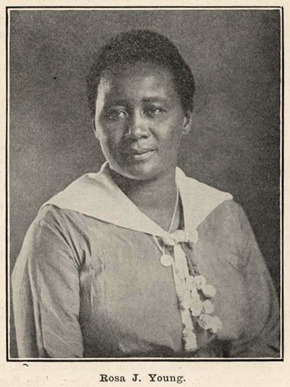|

Rosa Young was born on May 14, 1874, in Rosebud, Ala., the daughter of a black Methodist circuit rider. Nonetheless, she would write, “I was born and reared in gross darkness, wholly ignorant of the true meaning of the saving Gospel contained in the Holy Bible.”
What she meant was she did not know that Jesus had done all that is necessary for her salvation.
“I did not know that I could not read the Bible and pray enough to win heaven.” But she was also able to say that “the almighty God, for Christ’s sake, in a mysterious way, prepared and led me and a host of others out of the gross darkness which hung like a dense fog over our souls into the marvelous light of His salvation.”
After a hard start, Rosa graduated from Payne University in Selma, Ala., in 1909. She was 19 and had to sit through her valedictorian speech; she worked so hard she had a breakdown. Her speech stressed the obligation of service:
“ ‘He that is greatest among you shall be your servant,’ is the language of the Great Teacher. To serve is regarded as a divine privilege as well as a duty by every right-minded man.”
These were not empty words. She would live her life on the principle that she expressed in her speech. After several years as a teacher in neighboring towns, Rosa developed a longing to open her own school.
As she would later phrase it, “All good things come from God, even our good desires.” To her thinking, God gave her that desire and helped her fulfill it.
Rosa opened a private school with seven black students. In three terms, it had grown to 215 students, but she could not finance it.
Having exhausted every contact she knew in her effort to get funding, she went home and prayed and prayed and prayed.
Then she wrote to the famed African-American educator Booker T. Washington of Tuskegee Institute. Did he know anyone else she could contact?
Booker T. Washington wrote back. And, said Rosa, “In this letter he told me he was unable to help me in the least, but he would advise me to write to the Board of Colored Missions of the Lutheran Church. He said they were doing more for the colored race than any other denomination he knew of. He liked them because of the religious training which they were giving the colored people.”
Rosa applied to the Lutheran church for help. The Missouri Synod sent Pastor Nils Bakke to examine the situation. Help was forthcoming through Bakke, and Rosa joined the Lutheran church.
Thanks to the Lutherans and Rosa’s own unflagging efforts, Alabama had 30 rural schools. She also founded a high school and a junior college in Selma (the Alabama Lutheran Academy), on whose faculty she served. Its purpose was to prepare young women to teach in Christian day schools.
Rosa worked tirelessly most of her 96 years, and she even mortgaged her property to keep the work alive. She died in 1970.
Learn about 'The First Rosa'
|